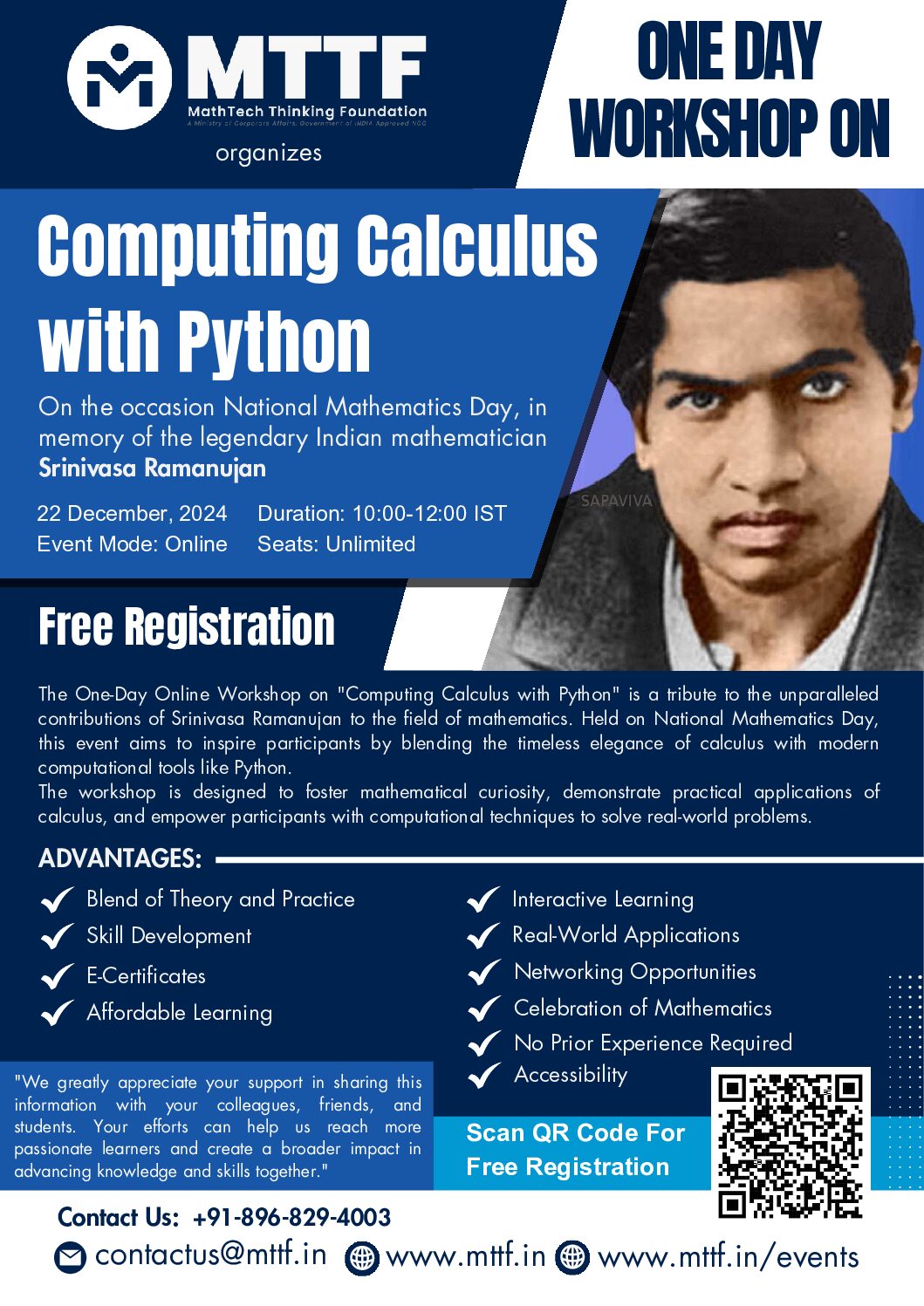One Day Workshop on Computing Calculus with Python

Event Date:
December 22, 2024
Event Time:
10:00 am
Event Location:
On the occasion National Mathematics Day, in memory of the legendary Indian mathematician Srinivasa Ramanujan
- Date: 22 December, 2024
- Duration: 10:00-12:00 IST
- Event Mode: Online
- Seats: Unlimited
- Free Registration
About the workshop
The One-Day Online Workshop on “Computing Calculus with Python” is a tribute to the unparalleled contributions of Srinivasa Ramanujan to the field of mathematics. Held on National Mathematics Day, this event aims to inspire participants by blending the timeless elegance of calculus with modern computational tools like Python.
The workshop is designed to foster mathematical curiosity, demonstrate practical applications of calculus, and empower participants with computational techniques to solve real-world problems.
Target Audience
This workshop is open to a broad spectrum of participants, including:
- Students: To gain foundational and advanced computational calculus skills.
- Educators: To explore innovative methods for teaching calculus.
- Researchers and Professionals: To apply Python in solving complex mathematical problems and STEM applications.
- Mathematics Enthusiasts: To celebrate and learn mathematics in the spirit of Ramanujan’s legacy.
Workshop Objectives
- Understand Computational Calculus: Introduce participants to Python libraries for differentiation, integration, and symbolic mathematics.
- Bridge Theory and Application: Demonstrate practical uses of calculus in various STEM fields.
- Hands-On Learning: Provide interactive coding sessions to ensure an engaging and practical learning experience.
- Celebrate Mathematics: Promote the importance of mathematics in everyday life while honoring the genius of Ramanujan.
Key Features
- Expert-led sessions on Python and calculus.
- Real-time coding demonstrations and exercises.
- Insights into the role of calculus in research and technology.
- E-certificates for all participants.
Organizational Goals
Through this workshop, we aim to:
- Promote computational skills in mathematics.
- Encourage the integration of programming tools like Python into mathematical education.
- Celebrate the enduring legacy of Srinivasa Ramanujan and inspire future mathematicians.
Why Python for Computing Calculus?
- Ease of Use: Python’s simple syntax makes it beginner-friendly, ideal for learning and implementing calculus concepts.
- Rich Libraries: Libraries like SymPy, NumPy, and SciPy provide robust tools for differentiation, integration, and solving equations.
- Symbolic Computation: Python supports symbolic mathematics through SymPy, enabling precise analytical solutions.
- Numerical Methods: Python excels in implementing numerical techniques for approximations in calculus.
- Visualization: Libraries like Matplotlib and Seaborn help create insightful graphs and visual representations of calculus problems.
- Real-World Applications: Python’s versatility allows integration with other domains, making it ideal for STEM applications.
- Open Source: Python is free to use, ensuring accessibility for students, educators, and researchers.
- Cross-Platform: Python works seamlessly across different operating systems, enhancing usability.
- Community Support: A vast community offers extensive resources, tutorials, and troubleshooting support.
- Industry Standard: Python’s widespread adoption in academia and industry ensures skills are relevant and valuable.
Content Outline
1 Welcome and Introduction (5 Minutes)
- Brief introduction to the workshop and its significance.
- Tribute to Srinivasa Ramanujan and the importance of National Mathematics Day.
2 Basics of Python for Mathematics (15 Minutes)
- Installing and setting up Python (brief overview).
- Introduction to Python libraries for calculus:
- NumPy: Numerical computations.
- SymPy: Symbolic mathematics.
- Matplotlib: Visualization of mathematical functions.
- Quick demonstration of basic Python syntax for mathematical operations.
3 Differentiation Using Python (20 Minutes)
- Concept of differentiation in calculus.
- Using SymPy for symbolic differentiation.
- Example: Derivatives of polynomials, trigonometric, and exponential functions.
- Practical applications:
- Slope of a curve.
- Optimization problems.
Hands-On Activity: Participants calculate derivatives and visualize them using Python.
4 Integration Using Python (20 Minutes)
- Concept of integration (definite and indefinite).
- Using SymPy for symbolic integration.
- Example: Integrals of polynomials, trigonometric, and exponential functions.
- Numerical integration with SciPy:
- Methods like Simpson’s Rule and Trapezoidal Rule.
- Practical applications:
- Area under curves.
- Accumulated quantities in physics.
5 Applications of Calculus in STEM (15 Minutes)
- Real-world examples demonstrating the utility of calculus:
- Physics: Motion under gravity and oscillatory motion.
- Engineering: Modeling electrical circuits.
- Data Science: Finding trends in data.
- Solving a real-world problem live using Python.
6 Visualization of Mathematical Concepts (15 Minutes)
- Graphing functions and their derivatives/integrals using Matplotlib.
- Animations to visualize changes in functions.
Hands-On Activity: Participants plot and interpret results interactively.
7 Closing and Q&A (10 Minutes)
- Recap of the session.
- Open floor for questions and discussions.
- Information on further resources for learning.
